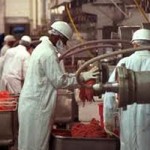
Alberta meat packing plant has troubled history.
by Gillian Steward
Most of us don’t give much thought to exactly where the beef comes from that ends up on our barbecues and dinner plates. Or who has a hand in getting it there.
In Canada, much of that meat passes through a huge slaughterhouse that sits on the windswept prairie next to the TransCanada Highway near the small city of Brooks in southeastern Alberta.
That meat packing plant, known as XL Foods, slaughters a million cattle a year and is now at the centre of the largest meat recall in Canadian history after E coli was traced to some of its products. Supermarkets and consumers across the country, as well as 30 US states, are being told to throw out or return roasts, steaks and ground beef rather than risk eating it.
Suddenly a remote meat packing plant matters to a lot of people.
But this isn’t the first time this particular plant has been in the news. It has, to say the least, a troubled history.
In 2005 it was the site of one of the province’s bitterest labour disputes. When employees joined the United Food and Commercial Workers union, the owner of the plant at the time, US-based Tyson Foods, refused to negotiate a first contract. Many of the workers were new immigrants or refugees from Sudan, Somalia and Philippines; others had been recruited from across Canada, but they voted to go out on strike.
A retired doctor recalled how workers would come to him with serious tendon problems in hands, elbows or shoulders.
Tyson wanted to keep the operation going — the plant can slaughter and butcher up to 5,000 cattle a day — so they bused in replacement workers, all legal in Alberta. But tempers ran high: at one point an RCMP riot squad was called in. And toward the end of the work stoppage the plant CEO and other managers were charged by the RCMP with dangerous driving after their car crashed into the union president’s car and injured him. Those charges were later dropped
During that strike I interviewed Dr Jean Worms, a retired physician who had practiced in Brooks for 30 years. Many of his patients worked at the plant.
He recalled how workers would come to him with serious tendon problems in hands, elbows or shoulders. “Some of them could barely open a hand because of the constant gripping of their instruments on the line,” he said.
Some workers told him that when they went back to the plant with a written recommendation that they be given time off work, or modified duties, the forms were torn up by supervisors. Sometimes the complainant was fired.
After three weeks, the union and Tyson struck a deal and the workers returned to their jobs. But still there were problems.
Michael Broadway, a USacademic and author, has been following the Brooks plant and other meat packers for more than 20 years. He maintains that it was after the 2005 strike that the plant began recruiting temporary foreign workers from China, Philippines, El Salvador and Ukraine.
In 2009 the plant was sold to Edmonton-based Nilsson Brothers Inc., whose business ventures also include auction markets and ranches.
The 2400-strong multicultural workforce slaughters and butchers about 5000 cattle a day.
According to Broadway, the new owners continued to hire temporary foreign workers, adding recruits from Mexico and Colombia to the 2,400-strong multicultural workforce. By early 2011, temporary workers comprised about a third of the plant’s labour force; immigrants and refugees already accounted for about 60 percent.
Workers recruited under Canada’s Temporary Foreign Workers program can’t change jobs and can’t bring family with them. They can stay in Canada for up to four years but when their contract is up, companies such as XL can nominate the workers for permanent residency.
The prospect of permanent residency for workers and their families is a powerful inducement to go along to get along, no matter the working conditions.
“For temporary workers, the balance is firmly in favour of the employer, with the threat of deportation hanging over any worker who’s considered disruptive,” Broadway wrote in Alberta Views magazine earlier this year.
Some workers have spoken out. During the past few months they told union representatives that too many carcasses were being processed far too quickly. “You can’t do that much work in that short a period of time without worker and public safety being compromised,” Tom Hesse of UFCW told the Calgary Herald.
But temporary foreign workers and new immigrants are easily dismissed. That’s too bad. If someone in authority had actually listened to those workers, maybe this whole mess could have been avoided and we could still trust that the meat on our dinner plates is safe to eat.
© Copyright 2012 Gillian Steward, All rights Reserved. Written For: StraightGoods.ca
 Gillian Steward is a Calgary writer and journalist, and former managing editor of the Calgary Herald.
Gillian Steward is a Calgary writer and journalist, and former managing editor of the Calgary Herald.
Sorry, the comment form is closed at this time.